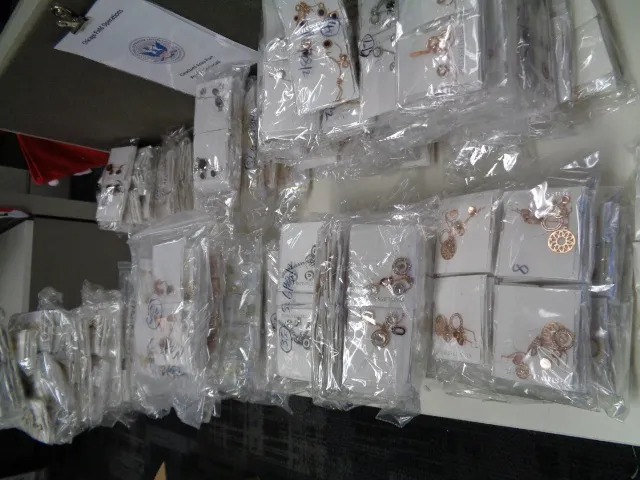CINCINNATI— From December 24-January 5, U.S. Customs and Border Protection (CBP) officers in Cincinnati and Indianapolis seized four large shipments of jewelry deemed to be counterfeit by CBP’s Centers of Excellence and Expertise, the agency’s trade experts.

recently seized several shipments containing
counterfeit jewelry, that if it was real would
have been worth almost $8.7 million.
On December 24, CBP officers in Cincinnati seized a shipment containing 13,467 pieces of counterfeit jewelry bearing protected trademarks of Bvlgari, Cartier, Coach, Gucci, Louis Vuitton, Michael Kors, Rolex, Tiffany, Tori Burch, and Versace. The jewelry, which came from China, would have been worth a total of $3,727,488 million had it been genuine.
Eleven days later, Indianapolis CBP stopped a shipment of 1,272 pieces of counterfeit jewelry bearing protected trademarks from multiple brands valued at $2,059,511. The following day, Indianapolis officers seized two shipments, one containing 278 items of counterfeit Cartier and Hermes bracelets and the other 1,680 items bearing a multitude of trademarks including Chanel, Dior, Pandora, Prada, and Tiffany. The shipments would have been worth $1,975,180 and $899,700 respectively had they been real.
The packages were headed to private residences in Laredo, TX, Omaha, NE, and White Plains, NY.
“This is just another example of the work our officers do to protect consumers and the U.S. economy,” said LaFonda D. Sutton-Burke, Director, Field Operations-Chicago. “As consumers increasingly purchase from online or third-party vendors, our officers are at the frontline to guard against defrauders expecting to make money selling fake merchandise.”
Intellectual property is a critical component of the U.S. economy, and Indianapolis Acting Port Director Timothy Hubbard and Cincinnati Port Director Richard Gillespie emphasized the necessary role CBP plays in protecting the economy and consumer safety and health.
“Legitimate trade strengthens our economy,” said Indianapolis Acting Port Director Timothy Hubbard, “but counterfeit and pirated goods threaten American jobs and innovation.”
“Protecting intellectual property rights remains a priority trade issue for CBP,” said Cincinnati Port Director Richard Gillespie, “and our officers are committed to American consumers and our economic security.”
The rapid growth of e-commerce enables consumers to search for and easily purchase millions of products through online vendors, but this easy access gives counterfeit and pirated goods more ways to enter the U.S. economy. U.S. consumers spend more than $100 billion every year on intellectual property rights (IPR) infringing goods, falling victim to approximately 20% of the counterfeits that are illegally sold worldwide.
CBP has established an educational initiative to raise consumer awareness about the consequences and dangers associated with purchasing counterfeit and pirated goods online or in stores. More information about that initiative is available at www.cbp.gov/fakegoodsrealdangers.
For more ways to protect yourself from counterfeit and pirated goods, visit https://www.stopfakes.gov/.
Follow CBP on Twitter @CBPChicago and @DFOChicago.

